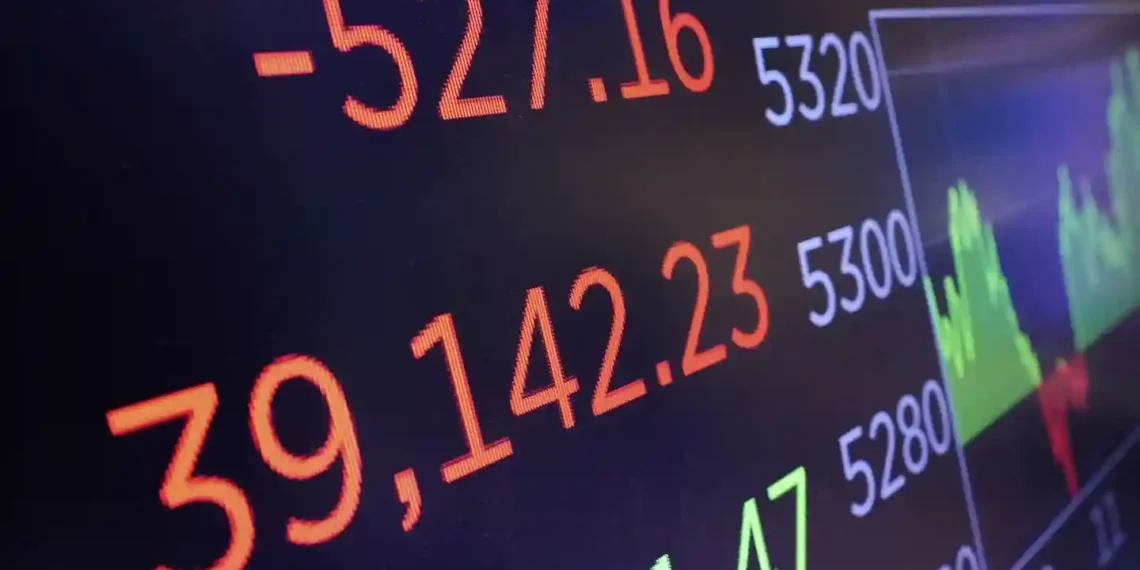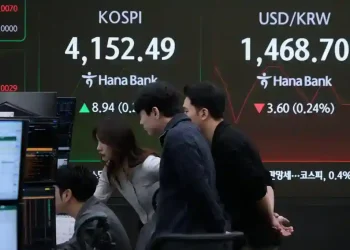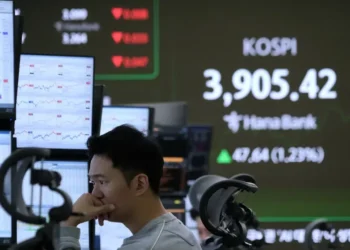Asian Markets See Modest Gains as Wall Street Faces Trade War Challenges
Asian stock markets were mostly higher in light trading on Good Friday, following a volatile session on Wall Street. The Dow Jones Industrial Average dropped 1.3%, largely due to UnitedHealth’s sharp decline after a weaker-than-expected profit report.
With U.S. stock and bond markets closed for the day, Asian investors took the opportunity to react to the latest global developments. Tokyo’s Nikkei 225 rose 1% to 34,730.28, while the Kospi in South Korea increased 0.5% to 2,483.42. Taiwan’s Taiex gained 0.3%, bolstered by a strong performance from Taiwan Semiconductor Manufacturing Co. (TSMC), whose quarterly profit matched analysts’ expectations. TSMC reassured investors that it had not seen a significant slowdown in demand due to the ongoing trade tensions between the U.S. and China.
However, TSMC remains cautious, with Chief Financial Officer Wendell Huang noting that there are still risks tied to potential tariff policies. Despite this uncertainty, TSMC’s U.S. stock climbed 0.1% on Thursday.
In contrast, the Shanghai Composite index slipped 0.1% to 3,276.73, while Bangkok’s SET index rose 0.6%. Many other markets were closed for holiday observances ahead of Easter.
On Thursday, the S&P 500 gained a modest 0.1%, though three-quarters of the stocks in the index posted gains. Meanwhile, the Nasdaq composite fell by 0.1%, continuing its subdued performance after a steep drop the previous day.
A key factor weighing on the market was Nvidia, which continued its decline due to news of new export restrictions on chips to China. These restrictions are expected to negatively impact Nvidia’s first-quarter earnings by $5.5 billion. The stock dropped 2.9%, making it one of the largest detractors from the S&P 500.
The Dow Jones Industrial Average experienced a significant drop of 527 points, primarily due to UnitedHealth’s 22.4% plunge, the largest drop since 1998. The insurer revised its financial outlook downward, citing higher-than-expected healthcare usage among its Medicare Advantage customers.
On a more positive note, oil and gas stocks rallied after crude oil prices regained some of the losses they had suffered earlier in the month. Diamondback Energy surged 5.7%, and Halliburton climbed 5.1%. U.S. benchmark crude oil rose by $2.18 to $64.01 per barrel, while Brent crude, the international standard, gained $2.11 to $67.96 per barrel.
The ongoing U.S.-China trade war remains a major source of uncertainty for markets. Economists continue to voice concerns that President Trump’s use of sharp tariff hikes could potentially lead to a recession if these tariffs are sustained.
Despite this, Trump offered a glimmer of hope on Thursday, suggesting that upcoming trade negotiations with other countries might reduce tariff levels. However, his comments about Federal Reserve Chair Jerome Powell added to the economic uncertainty. Trump criticized Powell for suggesting that tariffs could slow the economy and reignite inflation. The president called the Fed’s actions “too late and wrong,” even stating that Powell’s tenure should end soon.
This rhetoric from the White House presents a dilemma for the Fed: If it cuts interest rates to stimulate borrowing and spending, inflation could rise, which could harm the economy in the long term.
In the U.S., recent economic reports presented a mixed picture. One report showed that fewer workers applied for unemployment benefits last week than economists had expected, suggesting a stable job market. However, another report indicated that manufacturing in the mid-Atlantic region unexpectedly contracted, signaling potential challenges for the U.S. economy.
In Europe, stock indexes saw declines on Thursday, with France’s CAC 40 slipping 0.6% and Germany’s DAX falling 0.5%. This was following the European Central Bank’s decision to cut its main interest rate, a move that typically supports stock prices. However, since investors had anticipated the cut, its impact was muted.
The U.S. dollar weakened slightly, buying 142.37 Japanese yen, down from 132.44 yen on Thursday. The euro rose to $1.1375 from $1.1367.
As markets continue to navigate global trade tensions and economic uncertainty, all eyes will be on future developments, particularly regarding the U.S.-China trade talks and potential adjustments in monetary policy.
This article was rewritten by JournosNews.com based on verified reporting from trusted sources. The content has been independently reviewed, fact-checked, and edited for accuracy, neutrality, tone, and global readability in accordance with Google News and AdSense standards.
All opinions, quotes, or statements from contributors, experts, or sourced organizations do not necessarily reflect the views of JournosNews.com. JournosNews.com maintains full editorial independence from any external funders, sponsors, or organizations.
Stay informed with JournosNews.com — your trusted source for verified global reporting and in-depth analysis. Follow us on Google News, BlueSky, and X for real-time updates.














